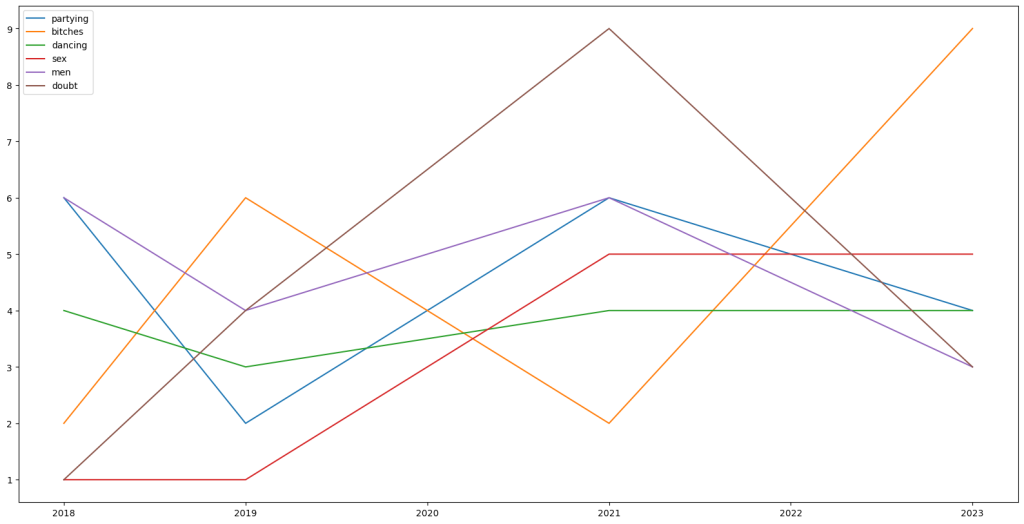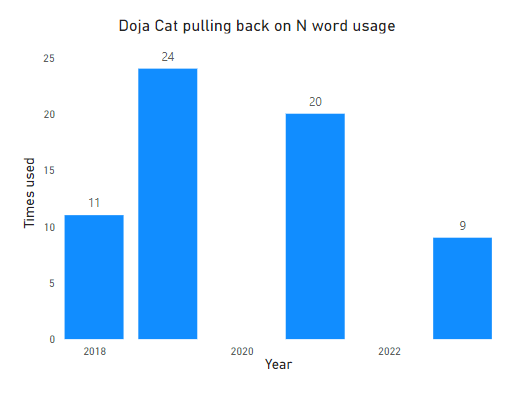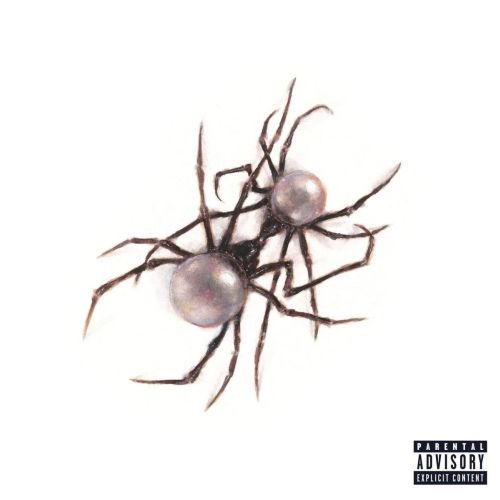Everyone’s favorite rebellious young lady is back with her fourth full-length project, “Scarlet”, and I’m still unclear on where I stand with Doja Cat. On the one hand, I’ve enjoyed her blend of toe-tapping pop and brief, approachable raps that occasionally veer into something of substance. On the other hand, her off-mic behavior continues to be troublesome, perhaps intentionally so, but it never seems to be a good look. Googling “Doja Cat backlash” brings back nearly 8 million results, although I’ll admit, those Google figures haven’t meant much in years. It’s nonetheless, hard to ignore, considering she currently has 72 million monthly streams on Spotify – behind Drake, she’s the most popular rapper around. I stress the term rapper because this appears to be the common difference between “Scarlet”‘s identity and the L.A. artist’s previous albums.
“Amala” (2018), “Hot Pink” (2019) and “Planet Her” (2021) leaned more into the accessible pop that has driven Doja’s success. Her debut “Amala” was primarily R&B, whereas “Hot Pink” added some edgier rhymes that solidified Doja Cat as the voice of a generation that has lived online. It was shortly after this album that we saw her behavior shift from rebellious to controversial – all of these moments are captured online, and usually followed shortly after by an apology (which is then deleted). Apologizing, and then removing the apology, is a recurring theme among celebrities with a predominantly online audience. The art of the non-apology is something Doja Cat has mastered, whereby a world that simply tolerated Donald Trump and Boris Johnson for many years, proves that saying something offensive or doing something reprehensible is often derided, but tolerated. In an online world, Doja Cat has navigated this tightrope between cancellation and talk of the town, not necessarily with ease, but she’s persevered. At least enough to make this rap nerd take notice when she declares her latest album a rap album.
Currently dating someone who treats women poorly, her legions of fans (called ‘Kittenz’) didn’t take kindly to her dismissive attitude toward them, but it says more about her fanbase than it does about her.
“If you call yourself a ‘kitten’ or f**king ‘kittenz’ that means you need to get off your phone and get a job and help your parents with the house.”
Doja Cat
The Internet doesn’t forget, but it also doesn’t stop listening to their music. Clearly, most people simply ignore the noise surrounding the artist. Just a few weeks back, she shared a photo of her supporting neo-Nazi YouTuber Sam Hyde but deleted it with no apology. It’s difficult to digest the rapper’s political leanings at this point, given Kanye West loves a bit of Hitler, and Benny the Butcher sides with Donald Trump. Part of me wonders if Doja Cat gets away with her behavior more than most because she’s continuously doing something iffy. She doesn’t have time to be canceled. Could it be purposefully designed? Controversy sells, after all, and so does sex, which Doja Cat’s music never strays far from.
For those new to Doja Cat, her style is like Ariana Grande if she spent her evenings studying early Eminem. Music designed for teenage consumption (particularly on TikTok) but also holds more artistic merit than the trashier offerings from a Sexyy Red or Cardi B. The smash hit “Paint the Town Red” is brash and unapologetic, and it’s easy to see why it’s been one of the year’s biggest hits. The Dionne Warwick sample is flipped well, but it’s the hook that stands out – Doja Cat just has this captivating vocal that makes her flippant attitude enticing. She knows she’s different, and is openly sticking a middle finger up at her naysayers, with a video that’s sure to anger everyone from Christians to vegans.
Her videos continue to merge arthouse creativity with promiscuity as if Nicki Minaj hired David Lynch to direct her work. There’s undoubtedly some influence from Nicki which is something she is aware of, and openly addresses on “Attention”. The critical reception to this album seemed to focus on a heavier emphasis on rapping, which is something I was keen to explore because Doja Cat isn’t highly regarded as an emcee. Nas openly derided her reputation on “Ultra Black” by declaring himself “ultra black, the opposite of Doja Cat”, and then himself had to apologize, claiming it wasn’t a diss. We’re in the apology era, it seems.
| Album | Words |
| Amala (2018) | 5,849 |
| Hot Pink (2019) | 5,791 |
| Planet Her (2021) | 5,942 |
| Scarlet (2023) | 8,192 |
There are nearly 30% more words in “Scarlet” than in her previous work, and this freedom to rap changes her whole approach. Songs are noticeably more aggressive and personable as if she’s getting a lot off of her chest. She admits this on “Attention”, but “Fuck the Girls (FTG)” is the most obvious example of this, hinting at higher levels of distrust in female friends. The decision to have no guest features plays up to the loner persona she portrays, creating a level of mystique that may mean her network is smaller, but her brand of controversial, unpredictable pop star is only enhanced.
Profanity levels are far higher too – Doja is pissed off. Previous albums haven’t been afraid to show this uncut side, but it comes across as a little heavy-handed. Across her four albums, 7 out of 10 of her most explicit tracks feature on “Scarlet”, with a notable emphasis on her active sex life. Doja’s controversial relationship with her YouTuber boyfriend J Cyrus is mentioned numerous times, but delivered in the crudest way – he’s only referred to by his penis. This is at least creatively delivered on “Gun”, with the metaphor of a gun being used. It’s nowhere near the inventiveness of Royce Da 5’9”’s “My Friend”, nor Nas’ “I Gave You Power”, but it hints at the intent behind injecting more hip-hop into the creative process. This fired-up version of Doja Cat clashes with her happier demeanor on the singles aimed at the mainstream, best exemplified by one of the album’s highlights, “Agora Hills”, a song that sees Doja demonstrate her ability to make a generic pop song addictive. Combining her hyper-sexual aesthetic with nerd culture is either a laser-targeted attack on a certain demographic or a response to her association with incels. This hefty piece of baggage aside, I just admired the fact that, while many female rappers showcase their lengthy fingernails in their videos, Doja goes the other way, and rocks what can only be described as ankle slicers.
In fact, there’s frequent mention of toes and feet throughout “Scarlet”, so if you’ve got a foot fetish, this is your album. Her immaculate imagery that is displayed in her videos juxtaposes this desire to make a proper hip-hop album, but there are moments on “Scarlet” where hip-hop heads will enjoy themselves. “Can’t Wait” is my favorite of these, a track that gets the equation of honest, believable rhymes, a killer hook, and a traditional drum pattern, just right. If the album had more of this production, it would feel more like the true rebirth that would help validate her claims to be the world’s biggest rap star. Jay Versace produced “Love Life”, a filthy beat that reminded me of the time Doja shared her appreciation for Little Brother. It’s not the same type of track Phonte and Big Pooh would do, but it has the swinging bass that a Khrysis instrumental does. London On Da Track laces “Ouchies”, which may be the most obvious example of her hip-hop influences as she gets rowdy, dispersing coded rhymes ripe for unpicking, including throwing a jab back at Remy Ma after a 2022 criticism of Doja:
“Yeah, and it’s so much ice (So much)
She wanna hit me I said, “No, Mike Tyson” (No Mike)
In 2050, they won’t know you, Otis (Uh-huh)
A hunnid billies, I’m the G.O.A.T, no Eilish (Yeah)
You full of Remy, now your face look tired (Yeah)
Used to be the baby ma, you marten now
You gon’ need another doc, can’t talk me down
You better pick her up ’cause hoes brawlin’ now, so come buck up”
Doja gets darker than she’s ever got on “Demons”. Literally, she goes ultra black, channeling wrestler Finn Balor, it’s a song that once again excels with imagery, but also includes some neat wordplay:
“I’m a puppet, I’m a sheep, I’m a cash cow
I’m the fastest-growing bitch on all your apps now
You are tired of me ’cause I’m on your ass now
You are mad at me ’cause I am all they slap now
I can nap now
Lots of people that were sleeping say I rap now
Lots of people’s hopes and dreams are finally trashed now
Lots of people say they met me in the past now
I done took the spotlight and made ’em black out
I done took the whole dick and blew my back out
I just swallowed all his kids and spit the class out“
I’m sure she’s at least aware of Finn Balor, as there is a Ric Flair skit at the start of “Balut”.
Drake may currently be the world’s biggest rapper, but everything about him feels grey, depressing, and formulaic when placed next to Doja Cat. She deserves credit for injecting gallons of color and personality into not just her videos, but her music too, and rhymes are not just more interesting for it, but they tackle different themes in a more confrontational manner befitting her controversial off-screen character. I wanted to explore this shift in her lyrics on “Scarlet” further, through some natural language processing – specifically sentiment analysis. As a data analyst by trade, I have been wanting to include some analytical techniques in my reviews for a while, and by examining an artist trying to express themselves differently on their fourth album, “Scarlet” is ripe for exploration. Topic modeling is a way of conducting this analysis, by, in its most basic definition, grouping common words and themes into topics.

The common themes running through Doja Cat’s music are dancing, partying, and men. These haven’t really deviated since 2018 but the way she raps about them has. She talks about men less on “Scarlet” but this is because of the increase in sexual language (the red line) – there was barely any sex on “Amala” and “Hot Pink” compared to the last two albums. The orange line relates to bitches, which, I know isn’t really a theme or topic, but my data model (using NLTK) identified bitch and bitches as two of the most common terms used, particularly on “Scarlet”. This increase makes more sense when you consider the theme of doubt (brown line) was so prevalent on “Planet Her”, yet isn’t on “Scarlet”. Doubt includes the words don’t, maybe, and couldn’t, showing Doja to be more defensive and/or indecisive before “Scarlet”, but is leaning into the b-word, almost as if it is a defense mechanism. Speaking of certain words, Doja, perhaps in response to criticism surrounding her racial identity (and maybe Nas?), has dialed back her use of the N-word.

While this shift in language is noticeable, it doesn’t stop this sounding like a Doja Cat album, just with a stronger emphasis on hip-hop. “Scarlet” is predictably polished, and at times, shines brightly, but it never dips every toe in. It still feels quite safe, and songs like “Wet Vagina” and “WYM Freestyle” are abrasive and repetitive, To bring it back to Nicki Minaj (because it will get under Doja’s skin!) – one Nicki verse on this album would stick out like a sore thumb. Doja isn’t the type of emcee who can body a beat, but I don’t think she needs to be. Clearly talented in more areas than many artists, her skills are varied but as a rapper, she excels in short, sharp bursts. Smart writing is evident in brief spells, and it’s clear that Doja Cat can rap, but it’s rarely the focus when you have such distracting pop smashes like “Paint the Town Red” and “Agora Hills”. She can often sound like the guest rapper on her own songs, which is why she doesn’t really need the collaborations that some emcees rely upon. But there’s no denying the clear star power on display throughout “Scarlet”, an album that is her most direct, and shows that a pissed-off rapper that has something to get off of their chest, often results in their best work.

